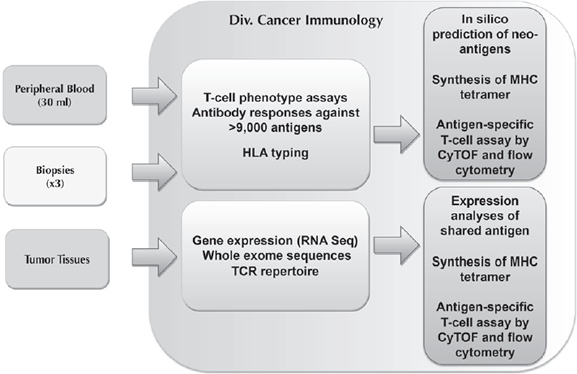Home > Organization > Division of Cancer Immunology(Kashiwa) > Research Summary
Research Summary
We have established a sample collection system of cancer tissues and peripheral blood from cancer patients such as gastrointestinal and lung cancers in the National Cancer Center Hospital East. Tumor infiltrating lymphocytes and peripheral blood lymphocytes are prepared and stocked in a cell bank with a barcode system. This system provides a chance to analyze kinetics of immune responses pre- and posttherapy including immunotherapy. Furthermore, somatic mutations and gene expression were also examined together to define the cellular immune response to neo antigens derived from somatic mutations and shared antigens derived from aberrantly or highly expressing self-antigens (Figure 1).

In collaboration with Osaka University, we addressed the role of FOXP3+ T cells in colorectal cancers. While abundant Treg-cell infiltration into tumors is significantly associated with poor clinical outcomes in various types of cancer, the role of Treg cells is controversial in colorectal cancers, in which FOXP3+ T-cell infiltration indicated better prognosis in some studies. FOXP3+ T cells infiltrating into colorectal cancers were divided into subpopulations including FOXP3+ suppressive Treg cells and non-suppressive inflammatory FOXP3+ T cells, and showed that colorectal cancers were classified into two types, one with predominant infiltration of immune-suppressive FOXP3-high Treg cells and the other with inflammatory non-suppressive FOXP3-low T cells in addition to FOXP3-high Treg cells. The two types showed opposite prognosis: the former type is poor, the latter better. In addition, the possible contribution of tissue cytokines (IL-12, TGF-βand TNF-α) and colonic microbiota (Fusobacterium nucleatum) to the development of the two different types was detected. Therefore, in addition to depletion of FOXP3hi Treg cells from tumor tissues to augment tumor immunity, strategies to locally increase FOXP3lo non-Treg cells, for example, by the use of specific microbes could be tumor-suppressive and -preventive.
